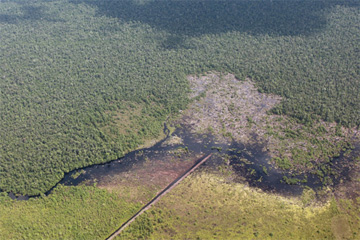Indonesia will not allow the conversion of natural forest for oil palm plantations, claimed the country’s Forestry Minister Zulkifli Hasan in comments reported by the Jakarta Post.
Speaking at a hearing on forestry and agriculture, Hasan said he has no plan to draft a decree to incorporate plantations in the forestry sector.
“There won’t be any forest conversion into oil palm plantations,” he was quoted as saying by the Jakarta Post. “If you ask me about forest conversion into oil palm estates, it is not now.”
Hasan’s comment contradicts a statement by Tachrir Fathoni, the ministry’s head of research and development. Fathoni said a recently completed draft of the decree would include oil palm plantations in the forestry code.
Environmentalists were skeptical.
 Draining and clearing of peat forest in Central Kalimantan. Photo by Rhett A. Butler. |
“The draft shows the government has no will to protect the forest,” Berry Furgon, executive director of Indonesian Environmental Forum (Walhi), told the Jakarta Post.
Furgon said the decree would sanction further deforestation. Indonesia is presently the world’s second largest deforester after Brazil. Expansion of oil palm plantations is a leading driver of forest loss.
The conflicting statements out of Indonesia’s forest ministry come as the European Union is reportedly mulling language that would promote the conversion of rainforests to oil palm plantations for biofuels. The move would be a boon to the Indonesian palm oil industry, which is already the world’s largest with roughly 7.9 million hectares of plantations.
In January, Hasan announced a plan to establish millions of hectares of new plantations across the country as part of Indonesia’s climate change mitigation strategy. The government hopes to attract foreign donors to support the effort. Critics fear the plan could boost greenhouse gas emissions if it allows the conversion of natural forests and peatlands to plantations.
The Indonesian government is also working to develop a national plan for REDD, a UN-backed program for reducing emissions from deforestation and degradation. REDD would fund forest conservation, sustainable forest management (i.e. reduced impact logging), and reforestation and afforestation. Oil palm plantations are presently excluded under REDD.
Reference: Adianto P. Simamora. Oil palm plantation not in forest sector: Govt. The Jakarta Post 02/23/2010.